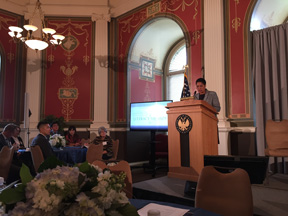UNESCO published a fact sheet in light of the 50th anniversary of International Literacy Day. The 2016 document notes that literacy rates are on the rise but millions remain illiterate. To access this 10 page publication (available electronically in English, French and Spanish), go to http://www.unesco.org/ulis/cgi-bin/ulis.pl?catno=245830&set=0057F276DC_1_13&gp=1&lin=1&ll=1
Monthly Archives: November 2016
Celebrating Literacy
 On October 27, 2016, Congress was quiet, out of session. In contrast, across the street in the Library of Congress, the halls were alive as over 80 literacy experts and advocates celebrated literacy efforts from around the world.
On October 27, 2016, Congress was quiet, out of session. In contrast, across the street in the Library of Congress, the halls were alive as over 80 literacy experts and advocates celebrated literacy efforts from around the world.
The Library of Congress Literacy Awards program recognizes outstanding literacy programs from around the world. This program is supported through the generosity of David M. Rubenstein, CEO and co-founder of The Carlyle Group. The Center for the Book in the Library of Congress administers the program under the direction of Pam Jackson. 2016 marks the fourth year of this important program.
The three winning literacy projects highlighted their work to a crowded room of knowledgeable experts. Donor David Rubenstein also interviewed the winner about their dedication and impact.
The Rubenstein Award winner WETA Reading Rockets provides online resources for teaching reading. These research-based materials help educators diagnose and support a broad spectrum of readers, including English language learners. The website is visited six million times per year.
The American Award winner Parent Child Home Program visits the homes of at-risk families (e.g., immigrants, refugees, poor) about 50 times to share early children literacy strategies. Families are given books and educational toys to foster an environment of reading. The trained visitors work in the mother tongue; 321 languages are address in this project.
The International Award winner Libraries without Borders works in twenty nations. Their main effort is their Ideas Box: a portable physical library with a print and digital collection and supporting technology. These libraries (shipped in four boxes) are given to needy communities, such as in Haiti and Colombia.
Fourteen other literacy projects were also recognized for their work, and they shared their work with the appreciative audience. The new Librarian of Congress, Carla Hayden, also congratulated these honorees.
Some projects focuses on rural communities, such as Ethiopia Reads, Students and Parents in Cooperative Education in rural Maine, and the nationwide Collaborative Summer Library Program.
Workplace literacy was a significant focus for several projects: Brazil’s Ze Pedo School Program, which targets construction workers; Afghanistan’s GIZ-Police Cooperation Project; and Cambodia’s SIPAR program, which supports literacy for garment workers.
A growing number of literacy project featured the role of technology. Library for All is an online digital library provided to children in developing countries. Materials are carefully chocsen to be written in local languages and be culturally relevant. Rumie, based in Canada, provides mobile tables with preloaded lessons and books; these tables are sold at cost of NGOs and partner organizations. Cell-Ed delivers short literacy lessons via cellphones, and offers a live literacy coach.
Research-based efforts were highlighted by New Zealand’s national Center of Literacy and Numeracy for Adults; the University of Pennsylvania’s National Cetner on Adult Literacy and International Literacy Institute; and the Chicago Literacy Alliance, which provides a common physical space for various literacy groups.
The event also enabled the audience to interact with the project representatives, and discuss literacy issues. The group strongly recommended more communication about literacy problems, and called for policies at all government levels to address these needs.
Several take-aways emerged from this event. Literacy involves not only access to reading materials, but also teaching reading and writing skills and promoting a reading culture. Reading is a lifelong journey that starts with the family. Reading empowers people, increases their productivity, and gets them more engaged in their community. Needs should drive the reading resources and services; the project objectives must match the targeted group’s interests. Content-based literacy is an effective approach, and technology can facilitate literacy. In the final analysis, literacy is a social responsibility of the entire community.
Applications for the 2017 Library of Congress Literacy Awards will be accepted starting the end of January. For more information, go to http://www.read.gov